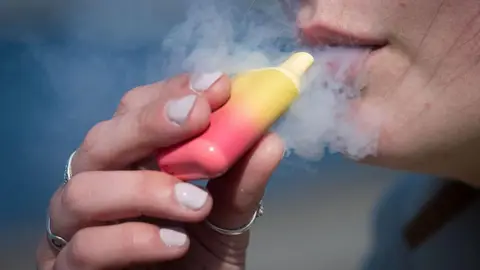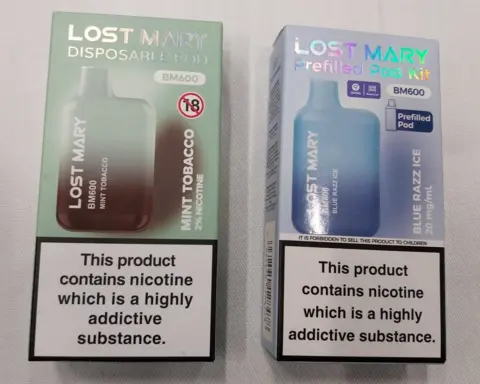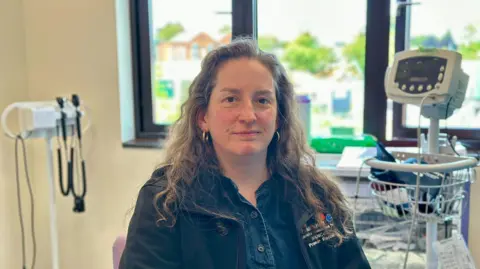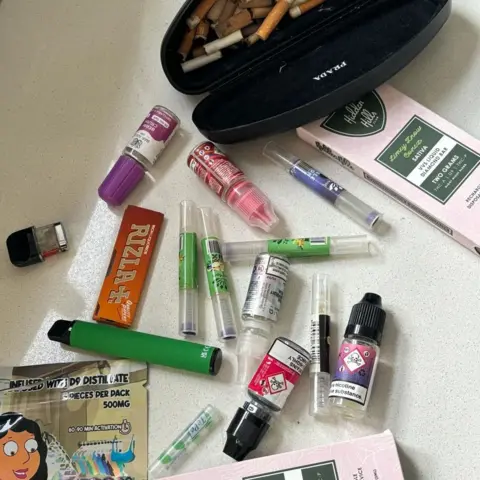Emma is doing something she swore she never would - buying her kids vapes
 Getty Images
Getty ImagesEmma is doing something she swore she would never do.
In an attempt to have some control over her children's vaping habits, she's resorted to buying them the vapes herself.
She's not proud of it, but says it feels like the only way to keep her two teenagers safe and reduce the high levels of nicotine they were consuming.
"It went against every bone in my body to do that, but they're addicted," Emma says. "It's not a simple case of telling them to stop – it is so much harder than that."
Emma believes her son, who she has asked the BBC not to name, began vaping in primary school.
He managed to keep it from her for a while, but by the time he got to high school, his protests of "that vape's not mine" had started to wear thin.
By the time Emma's son was 15, he was becoming breathless, contracted tonsillitis, and, at one point, was in so much pain, Emma called an ambulance.
"The paramedics said the incessant vaping could be causing this," she says. "They told him to try and stop, or at the very least cut down."
It was then Emma decided something had to change – she was going to take control and buy the vapes - trying to reduce their nicotine intake from 20mg to 10mg.
"I warned them – if I see them with a device that has more nicotine in – then I'll stop buying them any, full stop."
Emma says she felt she could then be confident the vapes would be from a reputable supplier, they wouldn't be illegal and contain other harmful products, and she could control the level of nicotine.
Not only is it illegal to sell vapes to anyone under the age of 18, it is also illegal to buy them for anyone underage. Emma knows what she is doing isn't legal, but feels this was her only choice.
She believes she has managed to reduce her son's nicotine intake, in part by buying the vapes, but also by having such an open conversation with him.
But Emma says the disposable vape ban, which came into effect on 1 June, has had little impact on her children's nicotine consumption.
It was introduced due to environmental concerns and to reduce the rising number of children and young people vaping.
While vapes provide a far healthier alternative to cigarettes, there are concerns that vaping provides a gateway into nicotine addiction - with disposable vapes enticing children and young people with their fruity flavours and cheap prices.
Health experts agree anyone who does not smoke should not start vaping, as it may cause long-term damage to the lungs, heart and brain.
But weeks after the ban came into force, Kate Pike from the Chartered Trading Standards Institute, says she fears it won't make any difference - and she says some rechargeable vapes, which are still legal to buy, are being marketed directly at children.
"We are finding compliant products – vapes that are refillable and rechargeable – with packs of stickers in them," she says. "What adult is going to want to decorate their vape with stickers?"
She also says it is very difficult to tell the difference between the now-illegal disposables and the legal refillable vapes. And due to some being fitted with pre-filled pods, they are still being used "like disposable vapes and discarded."

At Alder Hey Children's Hospital in Liverpool, home to the UK's first NHS vaping clinic for children, Professor Rachel Isba says parents should not be hard on themselves – they are fighting a battle against the might of a huge vaping industry.
"The important thing is not to judge your child; the world our young people live in is a difficult place to grow up in," she says. "There are so many competing pressures."
Her clinic supports 11-15-year-olds who have been referred by other NHS healthcare professionals. It has been open since January and already has a six-week waiting list.
"The children that come to see me have to want to see me and understand why they are here," Prof Isba says. "It could be that they are noticing a change with their bodies – they struggle to play sport without being out of breath for instance, or they're coughing up blood, or they just know they're addicted and they want to stop or cut down."

She says some young people are sleeping with vapes under their pillows so they can get a nicotine hit in the middle of the night, and their addiction can be so strong they experience "micro withdrawals" in school.
"They are consuming nicotine so frequently that they begin to feel anxious if they don't have it – even for the length of a double maths lesson, for example."
They then think they need the vape to reduce the anxiety, she explains, but it is nicotine withdrawal that is causing those feelings in the first place.
Prof Isba offers nicotine replacement therapy – such as gums and patches – and talks to them about how vaping affects their lives.
"We might discuss ways they might be able to cut down, what triggers them to vape and even how much money they might save simply by not vaping."
She says the government's Tobacco and Vapes bill is a good step forward but would like to see more paediatric addiction services across the NHS.
The problem is "far greater" than her clinic, she says, and she is concerned vaping could become a gateway drug into smoking and other dependences.
Dan from Twickenham, a father of three boys, agrees. He says the conversation about youth vaping is redundant because, he says, that "horse has bolted".
His 17-year-old got expelled from school in February because he was caught with cannabis in his vape, and his 14-year-old was close to losing his school place recently because of a similar issue.
"Vaping is a gateway drug," Dan says. "They become addicted to nicotine and then harder stuff follows.

"They've definitely smoked [cigarettes] and now my eldest is addicted to nicotine pouches. It's never ending."
A government spokesperson told the BBC it was taking "tough action" to tackle youth vaping - including giving Trading Standards the power to issue £200 on-the-spot fines to anyone found selling tobacco or vapes to people underage.
They also added that single-use vapes were a "blight on our streets" and that the government had made it compulsory for all vape retailers to provide recycling bins.
